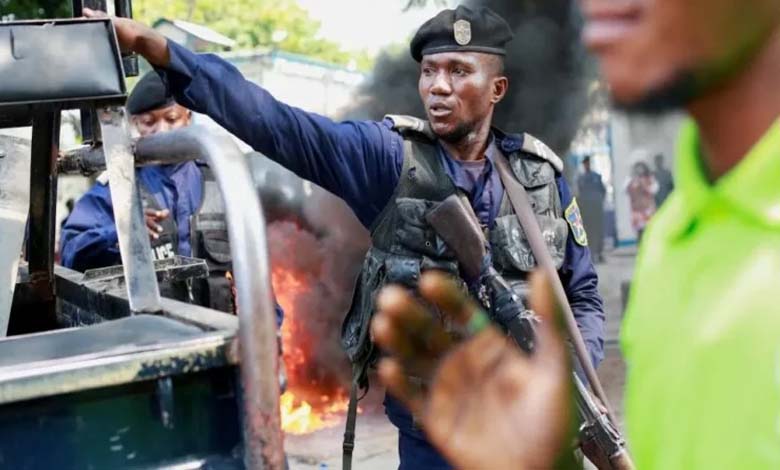Eastern Congo on the brink of war… “Earth’s Treasures” at the heart of the conflict

Earth’s natural resources have long been the key to most conflicts, and this is no different in Eastern Congo.
Recently, violent clashes broke out between the Congolese armed forces and the M23 armed group, which is opposed to the government and took control of Goma, the largest city in the east and the capital of North Kivu.
In Goma, the battles resulted in at least 2,900 deaths, according to the United Nations, and the rebels later advanced toward the southern Kivu region.
-
What is happening in the Democratic Republic of the Congo?
-
“Forgotten Conflicts”: From Africa to Haiti… 5 Crises Overlooked in 2024
Minerals… at the heart of the conflict
Last December, UN experts documented that M23 rebels have been funding themselves for several months through coltan, which is illicitly exported to locations beyond the borders.
In April, the rebels took control of the Rubaya coltan mine, the largest deposit of this mineral in the Great Lakes region, representing 15% of the world’s production of this mineral, which is particularly used in capacitors for phones and computers.
They also control the road leading to the border, and it is reported that 120 tons of Congolese coltan are smuggled out of the country every month, generating, according to UN experts, $800,000 in monthly revenue for M23, in the form of taxes and levies on miners and mining companies.
-
One Year After the Gabon Coup: What Has Changed?
-
Is South Africa the Financial Hub for ISIS in Africa?
This is one of the main sources of income for the armed group, in addition to money raised at roadblocks, taxes imposed on people, forced agricultural labor, and trade in wood and charcoal.
Lawsuit
According to Radio France Internationale, since the M23 rebels entered Goma, Kinshasa has requested the UN to impose an embargo on the export of all minerals labeled “Rwandan.”
The authorities in Kinshasa have also taken legal action against Apple in mid-December, with the American electronics company, accused of encouraging mineral smuggling to Rwanda, announcing that it had stopped sourcing materials from the Great Lakes region.
-
Report: Counterfeiting Money is One of the Methods Used by Terrorist Groups to Finance Their Activities
-
The Free Circulation of Weapons and the Infiltration of Terrorist Elements Have Aggravated Terrorism in Africa
In Europe, what is happening in Eastern Congo has become a politically sensitive issue, with the Belgian government and members of the European Parliament currently pressuring the EU to condemn the mineral partnership signed with Rwanda in February 2024.
Failures
The smuggling of Congolese minerals is a major source of funding for M23, but it predates the return of this armed group to the Democratic Republic of Congo.
Experts point out that the smuggling of coltan, along with gold, tungsten, and tin, has expanded widely since the mid-2000s, supported by other armed groups such as the Democratic Forces for the Liberation of Rwanda, opposed to the government of Paul Kagame in Kigali.
-
Russia strengthens presence in Burkina Faso, deals a blow to France
-
Analysts Uncover Terror Groups’ plans in the Dark Continent
The mineral is often sold at a higher price across borders, highlighting the failures of the traceability system that was created 15 years ago to prevent “blood minerals” from entering the electronics supply chain.
New Offensive
On Wednesday, the M23 launched a new attack in Eastern Congo, taking control of a mining town in the South Kivu region, resuming its advance towards the provincial capital, Bukavu.
After seizing Goma, the capital of the neighboring North Kivu province, last week, the group declared a unilateral ceasefire for humanitarian reasons, starting Tuesday. It confirmed that it “has no intention of taking control of Bukavu or other areas.”
-
Wars around the world drive military spending to double
-
Struggle between America and Iran in Sudan Raises Fears of Complicating the Forgotten Crisis
However, as dawn broke on Wednesday, fierce clashes erupted in South Kivu between the armed group and Congolese forces, according to security and humanitarian sources cited by AFP.
M23 seized the mining town of Nyabibwe, located about 100 kilometers from Bukavu and 70 kilometers from the regional airport.
Congolese government spokesman Patrick Muyaya told AFP, “This is clear evidence that the unilateral ceasefire that was announced was a trick, as usual.”
Over the course of this ongoing conflict that has lasted for more than three years, six ceasefire agreements have been reached in the region, but they have quickly been violated.












